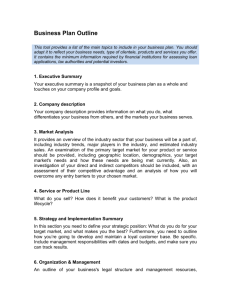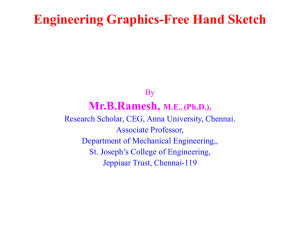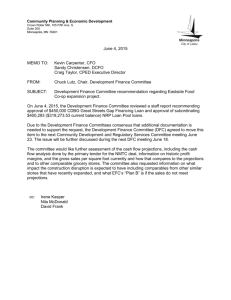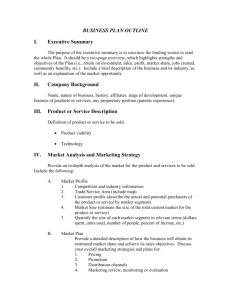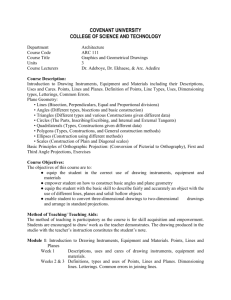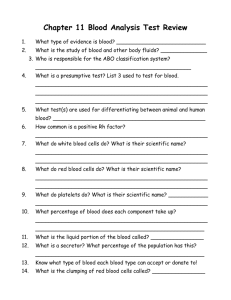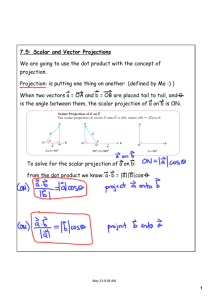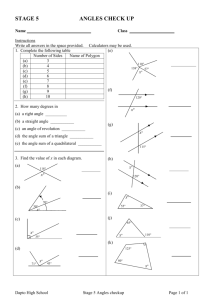graphic science_intro - t manjunatha sjce mysore
advertisement
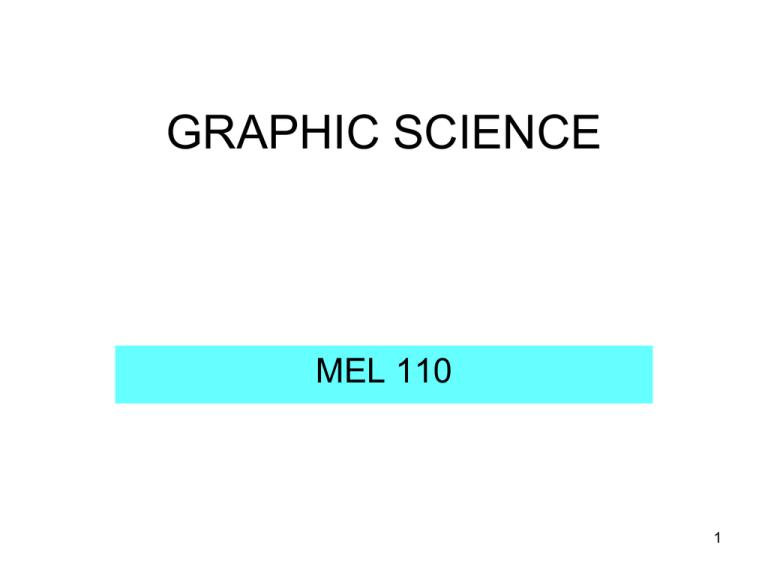
GRAPHIC SCIENCE MEL 110 1 WELCOME Name of teacher – Dr. Rahul Ribeiro Office: 174 Block III Email: rribeiro@mech.iitd.ac.in Off: 011-26591034 Cell: 9910683606 Personal home page- http://web.iitd.ac.in/~rribeiro/ You can also access it by going to ME dept. – faculty – Rahul Ribeiro – personal web page All powerpoint files used in this class and other instructions will be available at my homepage 2 under “courses”. Syllabus and text Lettering Dimensioning Projections (Orthographic, Axonometric, Isometric, Oblique, Perspective) Geometric constructions Auxiliary projections Projections of lines, planes, solids Intersection of surfaces Sectioning Development of surfaces Computer Aided Drawing Text books: Fundamentals of Engg. Drawing by Luzadder and Engineering drawing by N. D. Bhatt 3 Classes and marks weightage Venue, timings: 2 hrs. of lecture: TUE and WED 10.00 – 11.00 am in Block III LT2 4 hrs. of Practical in Work Shop 204 Weightage: Tutorial and practical - 40% Two minor tests – 15% each Major test – 30% 4 Instructions for equipment First 3 tutorials/practicals – Will be done on tracing sheets. Below the tracing sheets you will place graph or isometric sheets You will also need to bring HB pencils and eraser (no other instruments will be allowed) Position of lines and points will be guided by the graph and isometric sheets below All items are available in the SCOOPS shop or at nearby stationary shops 5 Instructions for equipment (contd.) Tutorial 4 onwards you will bring the following Approximately 21.5 x 15 in. drawing sheets Cello tape for fixing sheet to desk Compass (small and big) Divider Pencils (H and 2H) Mini drafter Metric scale and eraser 6 Mini Drafter (Tutorial 4 onwards) A mini drafter is a portable device used to draw parallel, inclined and perpendicular lines speedily. It is mounted on a drawing board at the top left corner. A drafter consists of a scale, a scale screw, a scale plate, steel bars, a bar plate and a clamping mechanism 7 Additional instructions Each tutorial will be given marks out of 10 All work is to be completed within the 4 practical hrs. Students are required to attend every lecture and tutorial You can miss upto certain number of classes and practicals for sickness and other contingencies ONLY WITH APPROPRIATE DOCUMENTATION AND APPROVAL A missed practical is to be completed within 5 days from the day of absence by attending a different sections practical session 8 Borders and title block What is Engineering Graphics? Pictorial representation of an engineering component Made up of points, lines, curves Follows certain rules of representation Top view Top viewing direction Front viewing direction Front view Cone 10 Example: sectional view of hand wheel R12 Shot blast 11 Section B-B Section A-A 12 LINES Lines are like the alphabet of a drawing language. Each line is used in a specific sense A line may be straight, curved, continuous or segmented Segmented may consist of dashes or dots or both It may be thick, medium or thin Pencil choice: Harder grade for thin lines, softer grade for thick lines H – Thick and medium 2H – Thin HB – Freehand You can also use H for all purposes but make sure to vary intensity by varying hand pressure 13 Different types of lines 14 Ref: Engg. Drawing, by Jolhe, McGraw-Hill 15 Ref: Engg. Drawing, by Jolhe, McGraw-Hill Lettering • Writing of titles, dimensions, notes and other important particulars on a drawing is known as lettering. • It should be done in clear, uniform, legible style. • The main titles are generally written in 6mm to 8mm size, sub-titles in 3mm to 6mm size, while notes, dimension etc. in 3mm to 5 mm size. • For maintaining uniformity in size, thin and light guide lines may first be drawn and lettering may then be done between them. • Use graph sheets to determine the spacing. • Inclined lettering is drawn at 75o to the horizontal 16 Dimensions of lettering 17 Example Gap 1mm 5mm 4mm Draw in single stroke 18 DRAWINGS: ( A Graphical Representation) The Fact about: If compared with Verbal or Written Description, Drawings offer far better idea about the Shape, Size & Appearance of any object or situation or location, that too in quite a less time. Hence it has become the Best Media of Communication not only in Engineering but in almost all Fields. 19 Drawings (Some Types) Botanical Drawings ( plants, flowers etc.) Nature Drawings ( landscape, Geographical scenery etc.) Drawings ( maps etc.) Building Related Drawings. Orthographic Projections 2-D Views Portraits ( human faces, expressions etc.) Zoological Drawings (creatures, animals etc.) Engineering Drawings, (projections.) Machine component Drawings Isometric ( Mech.Engg.Term.) 3-D View 20 ORTHOGRAPHIC PROJECTIONS: IT IS A TECHNICAL DRAWING IN WHICH DIFFERENT VIEWS OF AN OBJECT ARE PROJECTED ON DIFFERENT REFERENCE PLANES OBSERVING PERPENDICULAR TO RESPECTIVE REFERENCE PLANE Different Reference planes are Horizontal Plane (HP), Vertical Frontal Plane ( VP ) Side Or Profile Plane ( PP) And Different Views are Front View (FV), Top View (TV) and Side View (SV) FV is a view projected on VP. TV is a view projected on HP. SV is a view projected on PP. IMPORTANT TERMS OF ORTHOGRAPHIC PROJECTIONS: 1 Planes. 2 Pattern of planes & Pattern of views 3 Methods of drawing Orthographic Projections 21 VP 2nd 1ST Quad. Quad. Y Observer HP X Y X 3rd Quad. 4th Quad. THIS QUADRANT PATTERN, IF OBSERVED ALONG X-Y LINE ( IN RED ARROW DIRECTION) WILL EXACTLY APPEAR AS SHOWN ON RIGHT SIDE AND HENCE, 22 IT IS FURTHER USED TO UNDERSTAND ILLUSTRATION PROPERLLY. FIRST ANGLE PROJECTION FOR T.V. IN THIS METHOD, THE OBJECT IS ASSUMED TO BE SITUATED IN FIRST QUADRANT MEANS ABOVE HP & INFRONT OF VP. OBJECT IS INBETWEEN OBSERVER & PLANE. PP VP FV LSV Y X TV HP Open the planes out ACTUAL PATTERN OF PLANES & VIEWS IN FIRST ANGLE METHOD OF PROJECTIONS 23 2 PATTERN OF PLANES & VIEWS (First Angle Method) THIS IS A PICTORIAL SET-UP OF ALL THREE PLANES. ARROW DIRECTION IS A NORMAL WAY OF OBSERVING THE OBJECT. BUT IN THIS DIRECTION ONLY VP AND A VIEW ON IT (FV) CAN BE SEEN. THE OTHER PLANES AND VIEWS ON THOSE CAN NOT BE SEEN. PROCEDURE TO SOLVE ABOVE PROBLEM:TO MAKE THOSE PLANES ALSO VISIBLE FROM THE ARROW DIRECTION, A) HP IS ROTATED 900 DOUNWARD B) PP, 900 IN RIGHT SIDE DIRECTION. THIS WAY BOTH PLANES ARE BROUGHT IN THE SAME PLANE CONTAINING VP. Click to view Animation On clicking the button if a warning comes please click YES to continue, this program is safe for your pc. PP VP Y FV LSV Y X X TV HP 900 HP IS ROTATED DOWNWARD AND BROUGHT IN THE PLANE OF VP. 900 PP IS ROTATED IN RIGHT SIDE AND BROUGHT IN THE PLANE OF VP. ACTUAL PATTERN OF PLANES & VIEWS OF ORTHOGRAPHIC PROJECTIONS 24 DRAWN IN FIRST ANGLE METHOD OF PROJECTIONS NOTE • Front view is also known as ELEVATION • Top view is also known as PLAN 25 3 Methods of Drawing Orthographic Projections First Angle Projections Method Here views are drawn by placing object Third Angle Projections Method Here views are drawn by placing object in 1st Quadrant in 3rd Quadrant. ( Fv above X-y, Tv below X-y ) ( SYMBOLIC PRESENTATION OF BOTH METHODS WITH AN OBJECT STANDING ON HP ( GROUND) ON IT’S BASE. FV X Y Tv above X-y, Fv below X-y ) TV NOTE:- X 1st TV HP term is used in Angle method & For the same Ground term is used in 3rd Angle method of projections Y FV G L 26 FIRST ANGLE PROJECTION FOR T.V. IN THIS METHOD, THE OBJECT IS ASSUMED TO BE SITUATED IN FIRST QUADRANT MEANS ABOVE HP & INFRONT OF VP. OBJECT IS INBETWEEN OBSERVER & PLANE. PP VP FV LSV Y X TV HP ACTUAL PATTERN OF PLANES & VIEWS IN FIRST ANGLE METHOD OF PROJECTIONS 27 THIRD ANGLE PROJECTION FOR T.V. IN THIS METHOD, THE OBJECT IS ASSUMED TO BE SITUATED IN THIRD QUADRANT ( BELOW HP & BEHIND OF VP. ) PLANES BEING TRANSPERENT AND INBETWEEN OBSERVER & OBJECT. TV X Y LSV FV ACTUAL PATTERN OF PLANES & VIEWS OF THIRD ANGLE PROJECTIONS 28 FIRST ANGLE PROJECTION FOR T.V. IN THIS METHOD, THE OBJECT IS ASSUMED TO BE SITUATED IN FIRST QUADRANT MEANS ABOVE HP & INFRONT OF VP. OBJECT IS INBETWEEN OBSERVER & PLANE. PP VP FV LSV Y X TV HP ACTUAL PATTERN OF PLANES & VIEWS IN FIRST ANGLE METHOD OF PROJECTIONS 29 THIRD ANGLE PROJECTION FOR T.V. IN THIS METHOD, THE OBJECT IS ASSUMED TO BE SITUATED IN THIRD QUADRANT ( BELOW HP & BEHIND OF VP. ) PLANES BEING TRANSPERENT AND INBETWEEN OBSERVER & OBJECT. TV X Y LSV FV ACTUAL PATTERN OF PLANES & VIEWS OF THIRD ANGLE PROJECTIONS 30 FOR T.V. 1 ORTHOGRAPHIC PROJECTIONS FRONT VIEW L.H.SIDE VIEW x PICTORIAL PRESENTATION IS GIVEN DRAW THREE VIEWS OF THIS OBJECT BY FIRST ANGLE PROJECTION METHOD y TOP VIEW 31 FOR T.V. 3 ORTHOGRAPHIC PROJECTIONS FRONT VIEW L.H.SIDE VIEW X Y TOP VIEW PICTORIAL PRESENTATION IS GIVEN DRAW THREE VIEWS OF THIS OBJECT BY FIRST ANGLE PROJECTION METHOD 32 4 FOR T.V. ORTHOGRAPHIC PROJECTIONS FRONT VIEW L.H.SIDE VIEW X Y TOP VIEW PICTORIAL PRESENTATION IS GIVEN DRAW THREE VIEWS OF THIS OBJECT BY FIRST ANGLE PROJECTION METHOD 33 FOR T.V. 5 ORTHOGRAPHIC PROJECTIONS FRONT VIEW L.H.SIDE VIEW X PICTORIAL PRESENTATION IS GIVEN DRAW THREE VIEWS OF THIS OBJECT BY FIRST ANGLE PROJECTION METHOD Y TOP VIEW 34 6 FOR T.V. ORTHOGRAPHIC PROJECTIONS FRONT VIEW L.H.SIDE VIEW X Y TOP VIEW PICTORIAL PRESENTATION IS GIVEN DRAW THREE VIEWS OF THIS OBJECT BY FIRST ANGLE PROJECTION METHOD 35 TUT1 Qs. 3 Sketch the 3 orthographic projections in 1st. angle FOR T.V. 2 ORTHOGRAPHIC PROJECTIONS FRONT VIEW L.H.SIDE VIEW X Y TOP VIEW PICTORIAL PRESENTATION IS GIVEN DRAW THREE VIEWS OF THIS OBJECT BY FIRST ANGLE PROJECTION METHOD 37 TUT 1. Qs. 4 Sketch the orthographic views in 3rd. angle End of lecture 39
